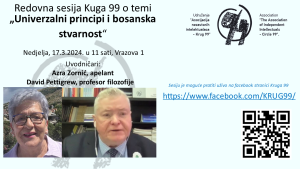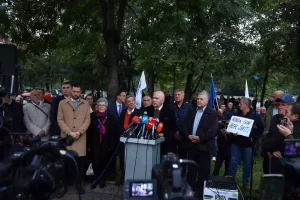US Foreign Policy Upside Down in Bosnia and the Western Balkans

| Sarajevo, 19 February 2023-30 Krug 99 (Circle 99) US Foreign Policy Upside Down in Bosnia and the Western Balkans It is regrettable that much of what had been long written predicted the coming crisis that was illustrated by the US embrace, ultimately backed by the Office of the High Representative embracing Dragan Covic and Milorad Dodik collaboration to delegitimize democracy by hijacking the idea of reform precipitated in the Sejdic-Finci and other judgements of the European Court of Human Rights, and replaced it with a formula that advances the worst impulses to give Bosnian Croat nationalists more leverage in the House of Peoples to overrepresent them. Not only was the law imposed at the bidding of the United States by High Representative Christian Schmidt during the actual conduct of the October 2022 elections, in violation of Bosnia’s law, but also of the Venice Commission’s longstanding stipulation that no new electoral laws should be adopted as late as the year before an election. The lack of respect for the rule of law enacted by the High Representative should cement his tenure in BiH as that of a German viceroy who advanced colonial like oppression in the heart of Europe, backed by the United States of America. Indeed, his use of the Bonn powers, now poses real threats to the sovereignty of Bosnia and undermines the notion of democratic aspirations for Bosnia. The US government’s tactics in Bosnia deserve derision that so many Bosnians have expressed in the street. I can be argued that the High Representative’s actions have caused real harm to an already complicated polity created under the auspices of the Dayton Peace Accords. Even Richard Holbrooke admitted before he died that the Dayton accords were never intended to remain in effect forever without changes and amendments. However, America has clearly lost its appetite to advance legitimate changes to the Bosnian constitution that America wrote and remains the legal structure of the country – leaving Jews, Roma and those who refuse to declare their ethnicity out in the cold, effectively barring all of them from running for office. The EU Court of Human Rights judgements on the electoral imbalances and its discriminatory constitution should have been the first consideration for Bonn Power consideration. If anything, these court decisions should have been imposed in part or in whole when the High Representative decided to impose “reform measures” to improve the electoral system. These decisions were left at the side of the road by the High Representative and the United States of America, although the Constitution of Bosnia as set in Dayton clearly states that “the rights and freedoms set forth in the European Convention for the Protection oi: Human Rights and Fundamental Freedoms and its Protocols shall apply directly in Bosnia and Herzegovina. These shall have priority over all other law.” US troops have long been gone from BiH, but tolerating nationalist thugs, especially those who are proxies of Russia, is not a strategic approach to supporting a beleaguered Bosnia, nor elsewhere in the Balkans. Indeed, the US has consistently sought policy solutions that counter the American core values of democracy, equality and respect for the rule of law. It appears America has given up on the idea of civic, democratic Bosnia and elsewhere in the Balkans. A case in point is that currently the State Department is currently working hard to extend helping hands to none other than Aleksandar Vucic, the president of Serbia. And the west is not getting much in return for their efforts. People should be urged to continue to demonstrate in the street for what is right – a living wage and a right to run for office too. These demonstrations matter and are noticed by bilateral governments represented in capitals across the Western Balkans. And with respect to Bosnia, Bosnian nationals need to be urged to work with Bosnian Diaspora in the United States to meet with their respective members of Congress and with their Senators. To make a difference in US foreign policy, these conversations must be with interested members of Congress. This is a path to pursue and put pressure on the Biden Administration to cease with this realist approach to Belgrade as the center of gravity in the Balkans. Indeed, the “Serbian World” created by Vucic should be dashed outright by the US, UK and EU. Stop the dancing around the obvious gaslighting here. Belgrade is the center of instability for the region and diplomats who continue to pursue efforts to break Serbia from Russia should recognize the futility of this cause. Support Civic associations and fund the NGOs who are doing the work of democracy 101 throughout the Balkans. This is where ideas, hope and activism remain alive. And the US, UK and the EU must engage with civil society by supporting democracy and human rights. As the Ukraine-Russian war enters its second year, it is now more important than ever before to promote democracy, human rights and equality. Any other pursuits by diplomats to cut deals with those who work against these basic tenets is a road not taken to what can cure Balkans. Over the last 30 years, US foreign policy towards the Balkans and Bosnia was marked with successive oscillations and unexpected ups and downs. Ups, always when that policy was on the track of own democratic and civilizational values as a true measure of relationship towards other nations. And downs, when that measure came down to realpolitik, pragmatic interests and unknown goals. It sometimes seemed these goals depended on the rating lists in the pre-election campaigns every two years, and not on a mighty and sophisticated political strategy founded on democratic principles. Thirty years ago, the Euro-Atlantic carrot seemed irresistible for people in Bosnia, who were expecting democratic transition believed to be rooted in the United States. Still, our Bosnian experience reminds one that the enormous democratic capacity of the US and the ever-possible alternatives should never be lost out of sight. *** Summary of the Session of 19 February by Tanya Domi, Adjunct Professor, Columbia University, School of International and Public Affairs; Harriman Institute Adil Kulenović, President |
| Association of Independent Intellectuals – Circle 99 (Bosnian: Krug 99), a leading Bosnian think-tank, was established in Sarajevo in 1993, in the midst of the Bosnian war (1992-1995), while the capital was under siege. Circle 99 provides a platform to bring together intellectuals of various professional and ethnic identities; university professors, members of the Academy of Sciences and Arts of Bosnia and Herzegovina, artists, journalists, entrepreneurs, diplomats, and other prominent figures from Bosnia and from abroad. Multidisciplinary discussions and initiatives are held each Sunday throughout the academic year, in the form of regular sessions about politics, science, education, culture, economy, and other societal issues. The overall goal is to sensitize the public towards a democratic transformation, achieving and maintaining peace, and integration of modern Bosnia into the community of countries fostering liberal democracy. Circle 99 has been declared an organization of special significance for the city of Sarajevo. |
| https://youtu.be/HyuevIdZX34 |







